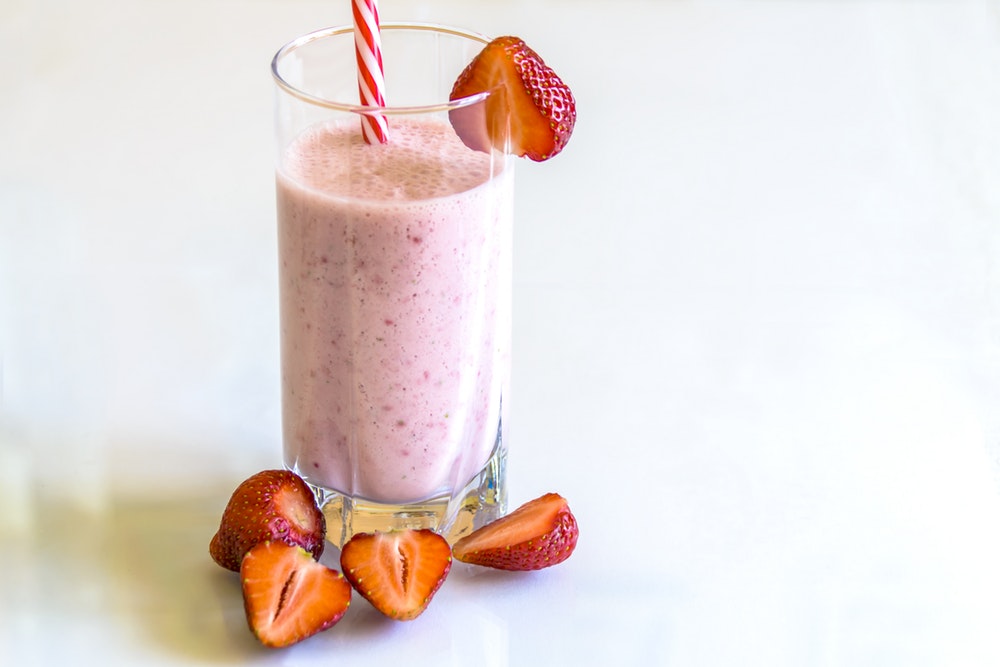From Slimfast to Visalis, Mercola Pure to SunWarrior, we’ve all had a protein shake, and chances are — we kinda liked it.
Who doesn’t love a tasty and refreshing shake or smoothie made with their favorite protein powder? Toss in some fruits, a few ice cubes, and a spoonful of chia seeds and you’ve even got a healthy meal, right? Well, actually, some people might disagree – and strongly. Let’s check out what the experts have to say about the pros and cons of protein powder.
First, let’s look at the pros:
You’ll lose weight and/or gain lean muscle
Research indicates that protein shakes are especially effective for weight management. Due to its low calorie and nutrient-dense consistency, the right protein powder can be very satisfying for hunger while simultaneously giving the body some of the protein it needs. According to a 2010 issue of the medical journal Diabetes/Metabolism Research & Review, obese individuals who drank high-protein meal replacement shakes as part of their low-calorie diet lost more weight in a year than those who did only the diet without with any replacement shakes. Since one scoop of the average protein powder contains approximately 20 grams of protein, equal to a medium sized chicken breast, its easier to meet your protein needs quickly with protein shakes than the alternatives. Additionally, the American Journal of Clinical Nutrition shared a study from their May 2008 issue which cited protein as the most satiating nutrient which can keep people fuller longer compared to either fats or carbohydrates.
You’ll Get Muscles, Baby
Most protein powders will provide easily digested proteins (most remarkably whey protein) which allows both an increase in lean muscle gain as well as quicker muscle recovery from damage which may occur during the necessary accompanying resistance training. Mentioned in a study from St. Francis Xavier University Department of Human Kinetics in 2001, subjects participating in a 6 week weight training program supplementing with whey protein powder gained more muscle than those given a placebo.
Timing is everything
Of course, timing has everything to do with the benefits of protein powder. For those who wish to supplement their morning protein to prepare for a day of activity, stir some into your cereal or sip it as a smoothie in your to-go bottle on your ride to work. If you’re concerned about muscle recovery, drink a shake right after your workout. Drinking some prior to bedtime diminishes overnight muscle breakdown while you sleep.
It’s Convenient
Having a long shelf life and being easy to prepare make protein powder a highly convenient diet option. It’s also better to grab a protein shake if you’re in a rush at lunchtime rather than running through the McDonald’s drive-thru for a value meal. But don’t skimp long-term: if you’re set on having protein shakes for lunch, pair them with a piece of fresh fruit or a handful of raw almonds to up the nutrition whenever you can.
Now for the cons:
It ain’t the real thing
Supplementing with protein is convenient and easy, but the fact is: it’s not the real thing, nor is it as healthy as getting protein directly from the protein source. Whole foods, according to some, are nutritionally superior to all man-made products, including protein powder. Using it instead of whole foods for an extended period of time can leave you nutritionally deficient in things like phytonutrients, dietary fiber and the antioxidants found in real foods. Consuming too much of it can also have negative health consequences — so be sure to take it only as directed.
Too much of a good thing is…well, a bad thing
If you’re already getting enough protein, supplementing with protein powder is not only unnecessary, it’s unhealthy. Too much protein can eventually lead to kidney damage, kidney stones, osteoporosis, or kidney disease, according to the Physicians Committee for Responsible Medicine.
They don’t work by themselves
As most dieters have learned, you can’t just take the protein shakes without adjusting other things in your life, like decreasing caloric intake overall and exercising. And the muscles don’t magically appear either; If you want to build those pretty lean muscles, you’ll need to add weight training to your workout.
The best way the experts recommend to use protein powder is as part of a well-balanced diet high in whole food nutrients as well as exercise and avoidance of cigarettes and other toxins. The key here, as with most things, appears to be balanceandmoderation.

